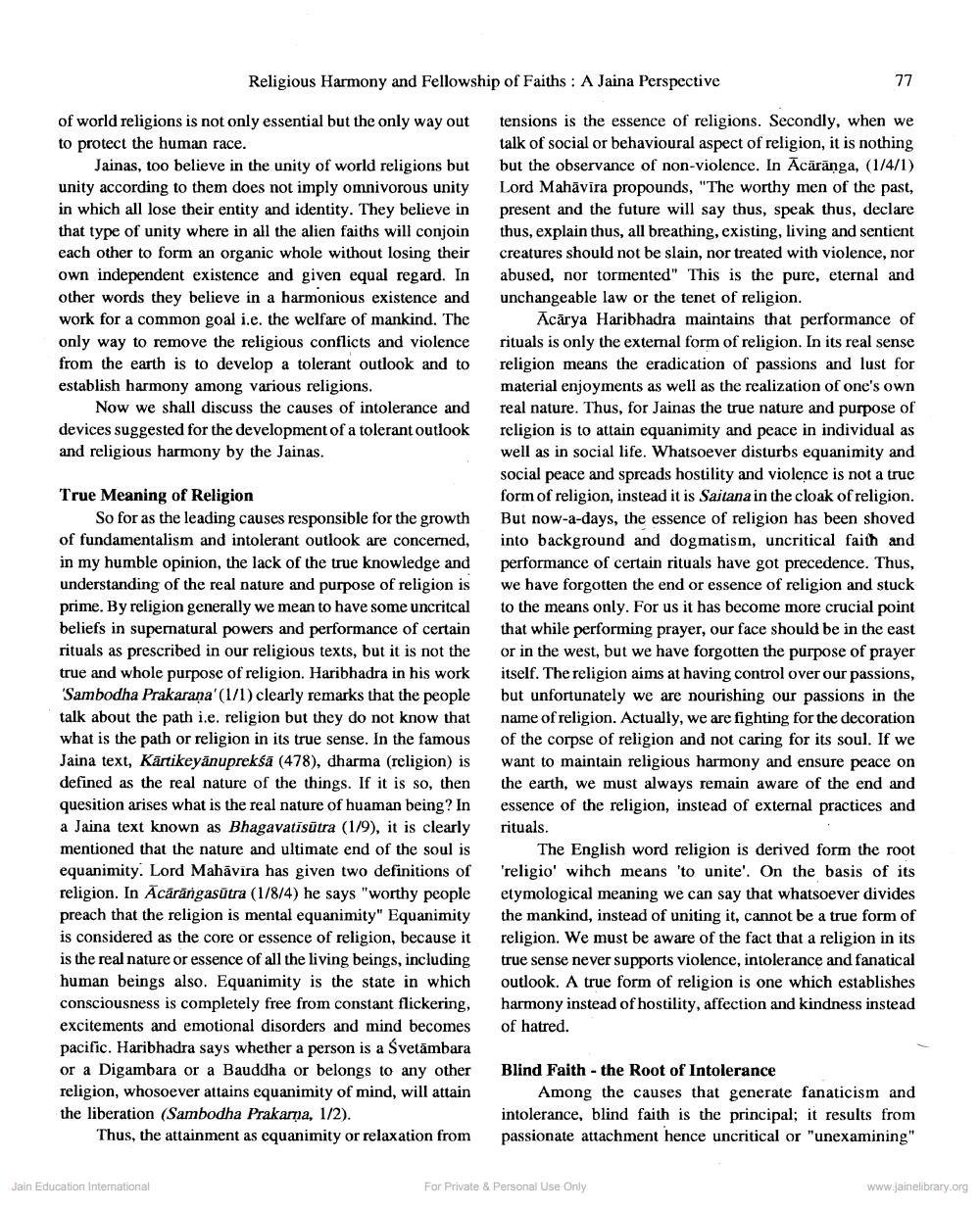Book Title: Religious Harmony And Fellowship Of Faiths A Jaina Perspective Author(s): Sagarmal Jain Publisher: Z_Jaina_Literature_and_Philosophy_a_Critical_Approach_001936_HR.pdf View full book textPage 4
________________ Religious Harmony and Fellowship of Faiths : A Jaina Perspective of world religions is not only essential but the only way out to protect the human race. Jainas, too believe in the unity of world religions but unity according to them does not imply omnivorous unity in which all lose their entity and identity. They believe in that type of unity where in all the alien faiths will conjoin each other to form an organic whole without losing their own independent existence and given equal regard. In other words they believe in a harmonious existence and work for a common goal i.e. the welfare of mankind. The only way to remove the religious conflicts and violence from the earth is to develop a tolerant outlook and to establish harmony among various religions. Now we shall discuss the causes of intolerance and devices suggested for the development of a tolerant outlook and religious harmony by the Jainas. True Meaning of Religion So for as the leading causes responsible for the growth of fundamentalism and intolerant outlook are concerned, in my humble opinion, the lack of the true knowledge and understanding of the real nature and purpose of religion is prime. By religion generally we mean to have some uncritcal beliefs in supernatural powers and performance of certain rituals as prescribed in our religious texts, but it is not the true and whole purpose of religion. Haribhadra in his work 'Sambodha Prakarana'(1/1) clearly remarks that the people talk about the path i.e. religion but they do not know that what is the path or religion in its true sense. In the famous Jaina text, Kartikeyanupreksa (478), dharma (religion) is defined as the real nature of the things. If it is so, then quesition arises what is the real nature of huaman being? In a Jaina text known as Bhagavatisūtra (1/9), it is clearly mentioned that the nature and ultimate end of the soul is equanimity. Lord Mahavira has given two definitions of religion. In Acărăngasútra (1/8/4) he says "worthy people preach that the religion is mental equanimity" Equanimity is considered as the core or essence of religion, because it is the real nature or essence of all the living beings, including human beings also. Equanimity is the state in which consciousness is completely free from constant flickering, excitements and emotional disorders and mind becomes pacific. Haribhadra says whether a person is a Svetāmbara or a Digambara or a Bauddha or belongs to any other religion, whosoever attains equanimity of mind, will attain the liberation (Sambodha Prakarna, 1/2). Thus, the attainment as equanimity or relaxation from tensions is the essence of religions. Secondly, when we talk of social or behavioural aspect of religion, it is nothing but the observance of non-violence. In Acärānga, (1/4/1) Lord Mahāvīra propounds, "The worthy men of the past, present and the future will say thus, speak thus, declare thus, explain thus, all breathing, existing, living and sentient creatures should not be slain, nor treated with violence, nor abused, nor tormented" This is the pure, eternal and unchangeable law or the tenet of religion. Acārya Haribhadra maintains that performance of rituals is only the external form of religion. In its real sense religion means the eradication of passions and lust for material enjoyments as well as the realization of one's own real nature. Thus, for Jainas the true nature and purpose of religion is to attain equanimity and peace in individual as well as in social life. Whatsoever disturbs equanimity and social peace and spreads hostility and violence is not a true form of religion, instead it is Saitana in the cloak of religion. But now-a-days, the essence of religion has been shoved into background and dogmatism, uncritical faith and performance of certain rituals have got precedence. Thus, we have forgotten the end or essence of religion and stuck to the means only. For us it has become more crucial point that while performing prayer, our face should be in the east or in the west, but we have forgotten the purpose of prayer itself. The religion aims at having control over our passions, but unfortunately we are nourishing our passions in the name of religion. Actually, we are fighting for the decoration of the corpse of religion and not caring for its soul. If we want to maintain religious harmony and ensure peace on the earth, we must always remain aware of the end and essence of the religion, instead of external practices and rituals. The English word religion is derived form the root religio' wihch means 'to unite'. On the basis of its etymological meaning we can say that whatsoever divides the mankind, instead of uniting it, cannot be a true form of religion. We must be aware of the fact that a religion in its true sense never supports violence, intolerance and fanatical outlook. A true form of religion is one which establishes harmony instead of hostility, affection and kindness instead of hatred. Blind Faith - the Root of Intolerance Among the causes that generate fanaticism and intolerance, blind faith is the principal; it results from passionate attachment hence uncritical or "unexamining" Jain Education International For Private & Personal Use Only www.jainelibrary.orgPage Navigation
1 2 3 4 5 6 7 8 9 10
